Gujarat Board GSEB Class 11 Commerce Accounts Important Questions Part 1 Chapter 4 Journal Important Questions and Answers.
GSEB Class 11 Accounts Important Questions Part 1 Chapter 4 Journal
Very Short Questions (VSQs)
Answer the following questions in one sentence : [1 mark each]
Question 1.
Why is journal considered as a fundamental or original book of Double Entry System ?
Answer:
Journal is the fundamental or original book on the basis of which all other books of accounts are written.
Question 2.
Which other name of rough books are known ?
Answer:
Rough books are also known as Tanchan or Tippan.
![]()
Question 3.
From which language the English word ‘Journal’ is derived? What is meaning it?
Answer:
English word ‘Journal’ is derived from Latin language. The meaning of it is a note or a diary.
Question 4.
Why rough book is not treated as a component of books of accounts ?
Answer:
In rough book transactions are not recorded in systematic manner. Thus, rough book is not treated as a component of books of accounts.
Question 5.
What is Being ?
Answer:
A brief explanation of the transaction is known as Being (Narration).
Question 6.
What is called combined journal entry ?
Answer:
Sometimes when related transactions take place at the same time, one account may be debited or credited more than once in a number of transactions, then it will be convenient to pass only one (single) entry for these transactions. This kind of entry is known as combined journal entry.
Question 7.
Why trade discount is given ?
Answer:
Trade discount is given so that retailers can sell goods at the printed price only and earn a reasonable profit deducting the expenses.
Question 8.
Why trade discount is not recorded in the books of accounts?
Answer:
Trade discount is neither an expense for the manufacturer nor the wholesaler nor an income for the retailer. Therefore, trade discount is not recorded anywhere in the books of accounts.
![]()
Question 9.
Which discount is recorded in the books of accounts?
Answer:
Cash discount is recorded in the books of accounts.
Question 10.
What is called allowance (Kasar) ?
Answer:
Many times businessman pays less amount or receives less amount at the time of final settlement. Whatever short amount is paid or received is known as allowance (Kasar).
Question 11.
How as a business entity or firm and the owner of business are considered from the view point of accounting?
Answer:
From the view point of accounting a business entity or firm and the owner of business are considered as separate.
Question 12.
Why goods account is not maintained in the business ?
Answer:
Goods account is not maintained in the business because from this account, we do not get the information (idea) about purchases, sales, purchase returns, sales returns, etc.
Question 13.
What is called bank charges?
Answer:
Bank provides various services to the trader, for which bank charges / recovers certain amount from the trader. It is known as bank charges.
Question 14.
Which account will be debited when goods are distributed as free samples?
Answer:
Advertisement expense account will be debited when goods are distributed as free samples.
![]()
Question 15.
Stamp duty and document expenses paid for the purchase of building should be debited to which account?
Answer:
Stamp duty and document expenses paid for the purchase of building should be debited to Building A/c.
Question 16.
Which account should be debited when the donation given from the business in the memory of grandmother?
Answer:
Drawings A / c should be debited when the donation given from the business in the memory of grandmother.
Question 17.
Which accounts are affected when building purchased for the business from the personal amount of trader?
Answer:
Building account and Capital account are affected when building purchased for the business from the personal amount of trader.
Question 18.
Which accounts are affected when life insurance premium paid by cheque from the business ?
Answer:
Drawings account and Bank account are affected when life insurance premium paid by cheque from the business.
Question 19.
Which account will be debited when cash withdrawn from the bank for office expense ?
Answer:
Cash A / c will be debited when cash withdrawn from the bank for office expense.
Question 20.
What is an accounting entry ?
Answer:
Summarised form of business transaction recorded in the form of debit and credit in the particulars column of the journal is called an accounting entry.
Question 21.
What do you mean by Journalisation?
Answer:
Process of entering business transactions systematically in summarised form in the journal is know as journalisation.
![]()
Question 22.
State the meaning of narration.
Answer:
Brief description of the transaction which is written in the brackets just below the accounting entry is called narration.
Question 23.
What is discount ?
Answer:
Deduction that is made in the price of the goods bought or sold or in the amount of cash to be received or paid is called discount.
Question 24.
Which column in a journal is not filled in at the time of journalising?
Answer:
At the time of journalising Ledger Folio (L.E) no. column is not filled in.
Question 25.
State the meaning of simple or separate entry.
Answer:
An accounting entry in which only two accounts are affected, i.e., one account is debited and the other is credited, is called simple or separate entry.
Question 26.
In which order the transaction are recorded in a journal?
Answer:
In a journal all business transactions are recorded in a chronological order, i.e., in the order of their occur ranee.
Question 27.
Which account is credited as per CPT study material of ICAI, when goods given as donation ?
Answer:
As per CPT study material of ICAI, Purchase A/c is credited, when goods given as donation.
![]()
Question 28.
Which written document is must for all transactions recorded in the journal ?
Answer:
A voucher which is written document is must for all transactions recorded in the journal.
Question 29.
Where the every business transaction is recorded first ?
Answer:
Every business transaction is recorded first in the journal.
Question 30.
Brokerage paid on purchase of goods is debited to which account?
Answer:
Brokerage paid on purchase of goods is debited to Brokerage A/c.
Question 31.
How many columns are kept for writing the amount of transaction ? Which are they ?
Answer:
Two columns are kept for writing the amount of transaction. They are (1) Debit amount column and (2) Credit amount column.
Question 32.
How many columns are there in the journal book? Explain they in brief.
Answer:
There are five columns in the journal book. They are
(1) Date, (2) Particulars, (3) L.F., (4) Debit (₹) and (5) Credit (₹).
Question 33.
What are ‘Borrowed loan’ and ‘Lent loan’ for business ?
Answer:
Borrowed loan is a liability of business while Lent loan is an asset of business.
Question 34.
Why lent loan is debited ?
Answer:
Lent loan is receivable of business, therefore, it is debited.
![]()
Question 35.
At the time of preparation of invoice, which discount is deducted?
Answer:
At the time of preparation of invoice, trade discount is deducted.
Short Sums for Journal Entry
Write the journal entries from the given transactions: (3 or 4 marks each sum)
Question 1.
Write the journal entries for the following transactions :
1. Started business by bringing in cash ₹ 30,000.
2. Purchased furniture of ₹ 5,700.
3. Paid ₹ 1,500 for salary.
4. A planning is made to buy one A.C. machine worth ₹ 45,000.
Answer:
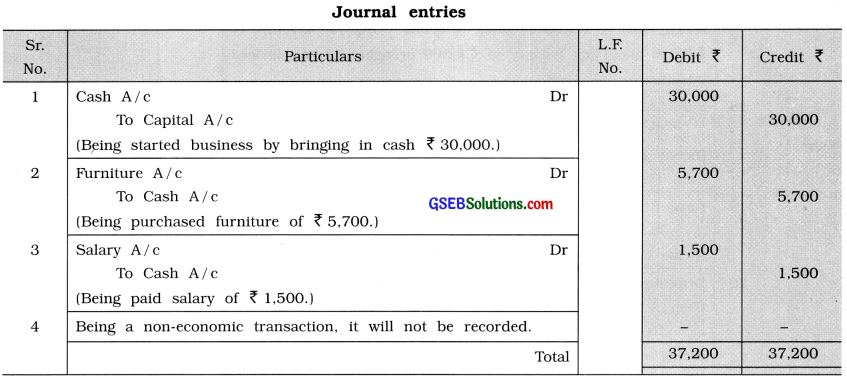
Question 2.
Write journal entries for the following transactions :
2019
January 16 A business is commenced with introduction of cash of ₹ 15,000; stock of goods of 10,000; furniture of ₹ 5,000 and bank balance of ₹ 6,500.
18 Goods of f 30,000 purchased at 10% trade discount from Royal Stores.
19 Electronic weighing machine purchased for 14,000.
20 Withdrew from the bank ₹ 400 for household expense and ₹ 800 for office expense.
Answer:
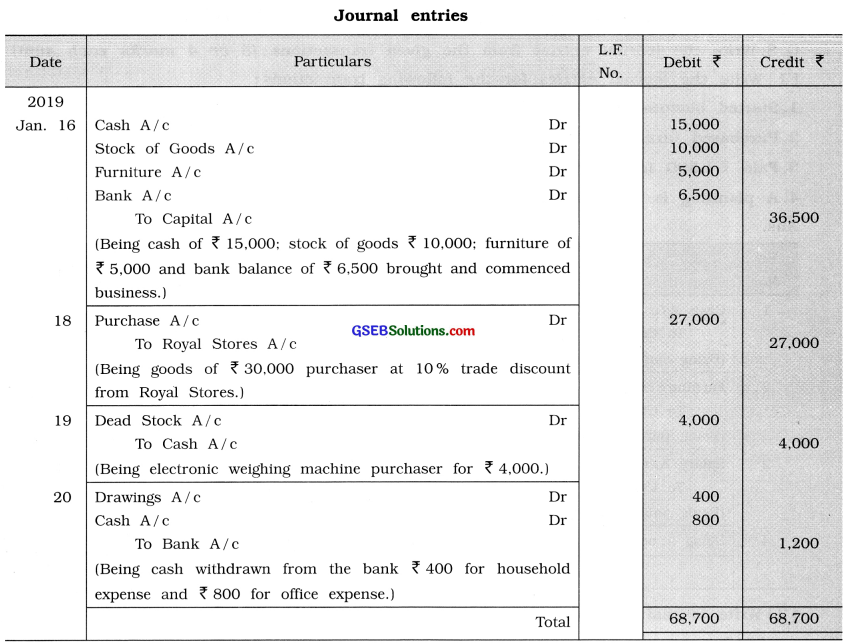
![]()
Question 3.
Write journal entries for the following transactions in the books of Murlidhar.
2019
May 1 Goods of ₹ 1,000 is withdrawn from business for personal use.
2 Goods of ₹ 700 destroyed by fire. It was not insured.
7 Goods of ₹ 500 given as donation.
Answer:
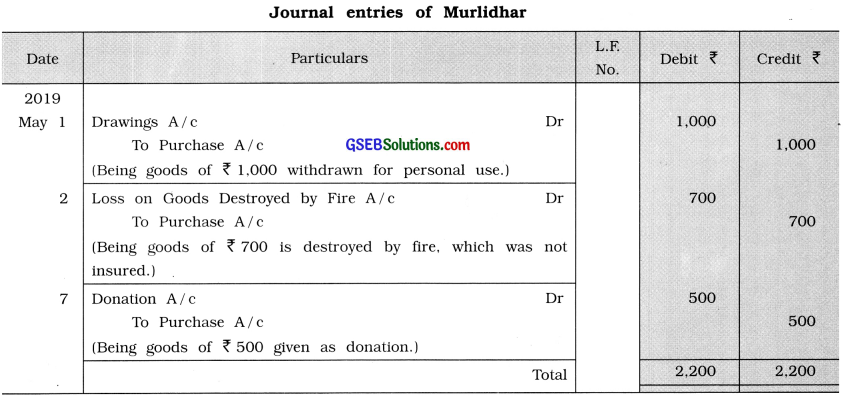
Question 4.
Write journal entries for the following transaction in the books of Prisha:
2019
Jan. 7 Purchased electronic weight machine of ₹ 2,000 and purchased 100 Navneet calender 2017 of ₹ 2,000 to be given to the customers as new year gift.
11 Received VAT refund ₹ 3,200 and income tax refund ₹ 2,800.
13 After adding 20% profit, goods of ₹ 4,000 sold to Bijal. Carriages of ₹ 100 paid on her behalf.
15 ₹ 3003 was due from Danish, he paid ₹ 3,000 as a final settlement.
Answer:
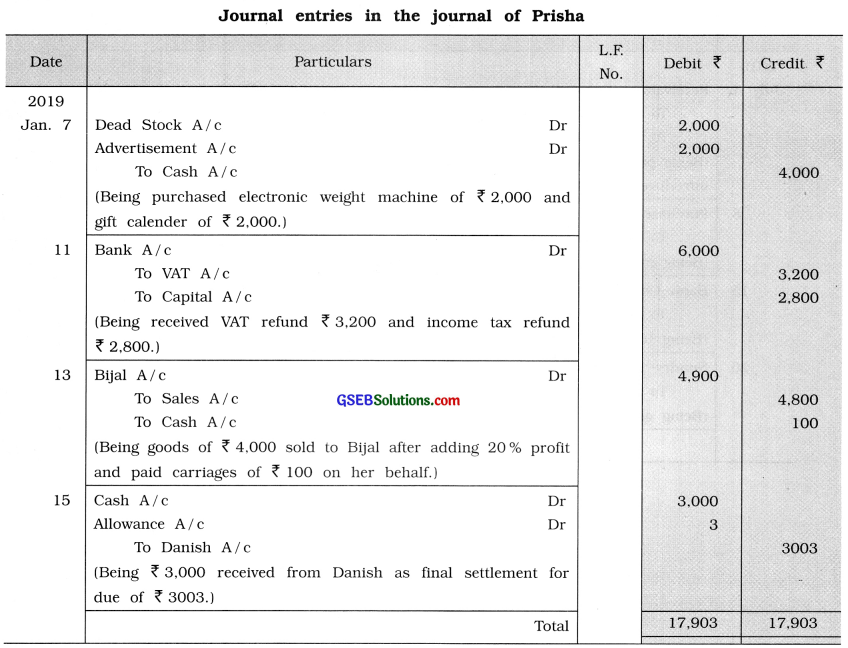
![]()
Question 5.
Pass journal entries for the following transactions of Prem Vegetable Stores :
2019
July 5 Brought in personal receivables of ₹ 6,000 and payables of ₹ 4,000.
8 Goods Stolen received back of ₹ 1,200 on police investigation.
15 Bank has approved overdraft of ₹ 80,000; which bank has debited documentary charges of ₹ 1,000.
20 Goods of t 100 eaten by cow.
Answer:
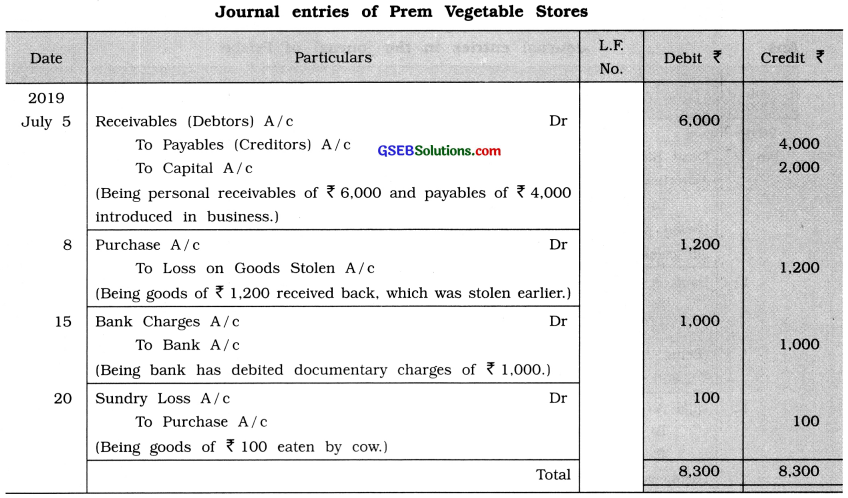
Question 6.
Record the following transactions in the journal books of Sejal:
2019
April 1 A business is commenced with introduction of cash of ₹ 1,20,000 receivables of ₹ 60,000, payables of ₹ 30,000 and stock of goods of ₹ 50,000.
4 Opened current account with Gujarat Bank by depositing ₹ 25,000.
9 Goods of ₹ 40,000; purchased from Karnal at 10 % trade discount and 8 % cash discount. Quarter amount paid by cheque of Gujarat Bank.
12 Goods of ₹ 1,000 destroyed by fire. It was fully insured.
Answer:
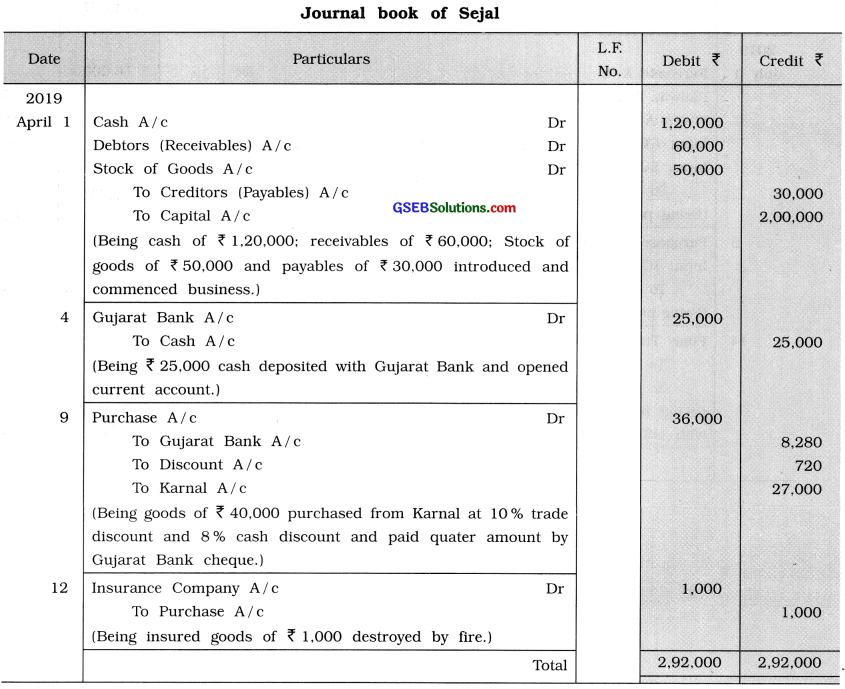
![]()
Question 7.
Record the following transactions of July, 2019 in the books of Shri Jaydeep Patel of Ahmedabad. 12 % GST is applicable for all these transactions :
2019
July 1 Purchase goods of ₹ 20,000 at 10 % trade discount from Kuldeep Shah of Baroda. We paid all amount including ₹ 1,800 for railway freight and ₹ 700 for wages by cheque.
5 Purchase goods of ₹ 30,000 from Pune Trading Company (Maharashtra).
14 Returned l/3rd of goods purchased from Pune Trading Company (Maharashtra).
Answer:
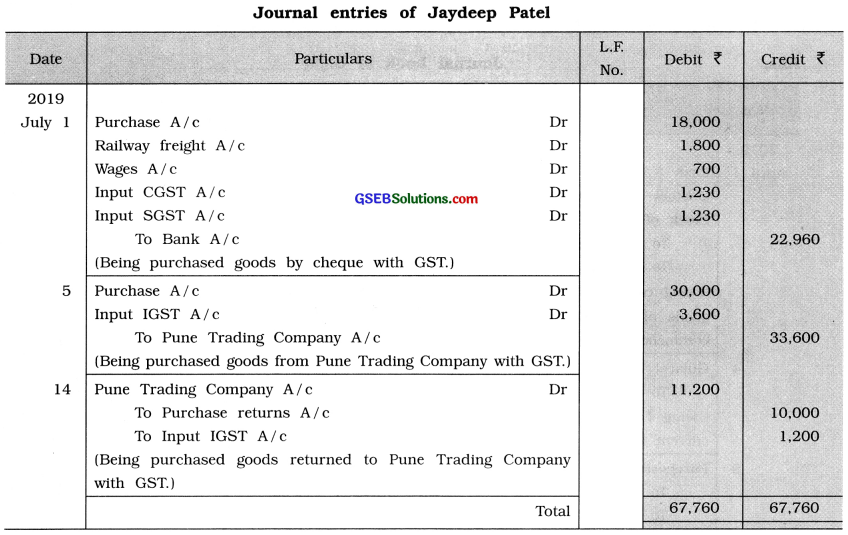
Question 8.
Record the following services transactions of Gala Trading of Surat. 2.5 % CGST; 2.5 SGST and 5% IGST are applicable.
2019
May 1 Transport expense paid ₹ 8,000 to Shriram Transport by cheque.
8 Paid insurance premium for office of ₹ 5,000 by cheque.
12 Paid advertisement expense of ₹ 10,000 to Royal Ad. Co. of Mumbai (Maharashtra) by cheque.
15 Received commission of ₹ 4,000 by cheque.
Answer:
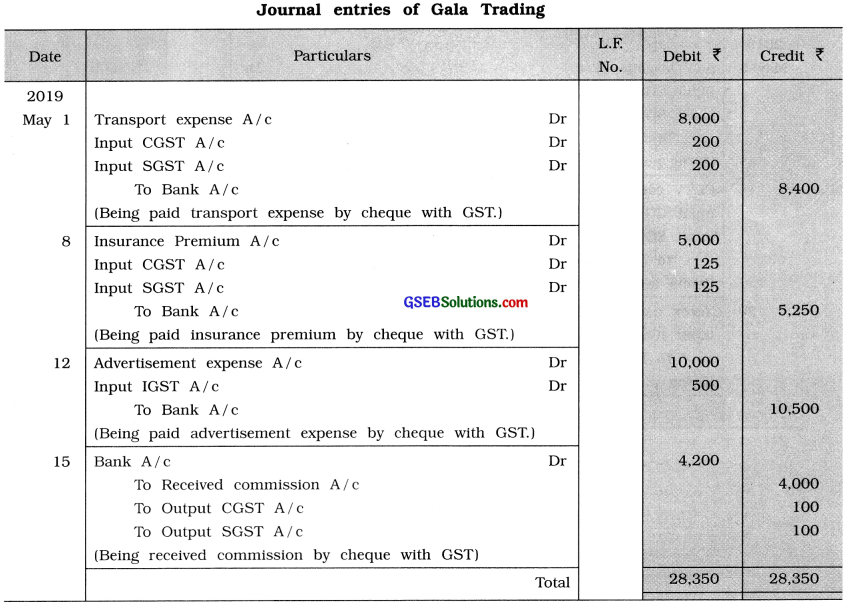
![]()
Question 9.
Record the following transaction of August 2019 in the books of Vikas Traders of Rajkot. 18 % GST is applicable for the assets transactions of business.
2019
May 5 Purchase A.C. Machine of ₹ 50,000 from Croma Trading of Bhavnagar.
15 Purchase CCTV camera of ₹ 10,000 from My Electronics Co. of Bagodara by cash. 20 Purchase Xerox machine of ₹ 40,000 from L.G. Xerox Co. of Pune city by cheque.
Answer:
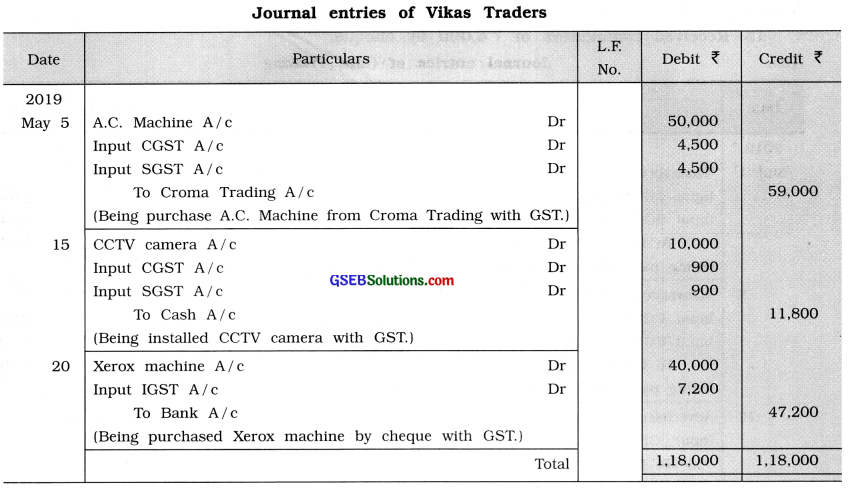
Question 10.
Record the following transaction of April 2019 in the books of Bijal Shah of Vadodara. 6% CGST; 6 % SGST and 12 % IGST are applicable of business transactions.
2019
April 1 Sold goods of ₹ 30,000 at 10 % trade discount to Karnal Shah by cheque.
10 Sold goods of ₹ 40,000 at 10 % cash discount to Manoj Bhatt.
18 Half goods returned from Manoj Bhatt.
Answer:
Note: When the location is not mentioned in the business transaction, then calculate of GST of the transaction as it has happened within the state.
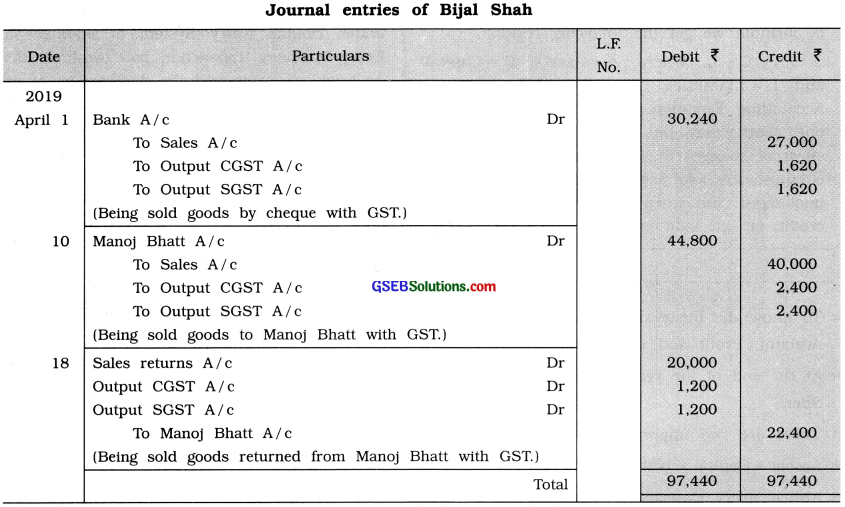
![]()
Multiple Choice Questions (MCQs)
Write the correct option from those given below each question : [1 mark each]
Question 1.
When more than two accounts are associated at the same time in any accounting transaction, in such cases which journal entry is passed ?
(a) Combined
(b) Separate
(c) Special
(d) General
Answer:
(a) Combined
Question 2.
Which is an original or fundamental books of accounts?
(a) Ledger
(b) Journal
(c) Tanchan
(d) Petty cash book
Answer:
(b) Journal
Question 3.
If bank debits bank charges in the bank account of businessman, then which effect is created on bank balance ?
(a) Balance decreases
(b) Balance increases
(c) Balance settled
(d) No effect on balance
Answer:
(a) Balance decreases
Question 4.
From the following, what is true, when received cheque is deposited in bank?
(a) Cash balance increases
(b) Cash balance decreases
(c) Bank balance decreases
(d) Bank overdraft decreases
Answer:
(d) Bank overdraft decreases
Question 5.
In which type of transaction risk of bad debts is there ?
(a) Cash transaction
(b) Credit transaction
(c) Exchange transaction
(d) Non-economic transaction
Answer:
(b) Credit transaction
Question 6.
Which account is debited when income tax is paid by cheque from the business ?
(a) Bank account
(b) Tax account
(c) Capital account
(d) Drawings account
Answer:
(d) Drawings account
![]()
Question 7.
Amount of wages for installation of machinery should be debited to which account?
(a) Wages account
(b) Machinery account
(c) Installation expense account
(d) Cash account
Answer:
(b) Machinery account
Question 8.
Amount of ₹ 9,000 payable to Yash, is agreed to by Prem. In this transaction, which account is credited?
(a) Yash account
(b) Prem account
(c) Cash account
(d) Drawings account
Answer:
(b) Prem account
Question 9.
Purchased cloth of ₹ 2,720 from Anand Stores for personal use and paid ₹ 2,700 by cheque. In this transaction, by which amount Drawings account is debited ?
(a) ₹ 20
(b) ₹ 2,700
(c) ₹ 2,720
(d) ₹ 5,420
Answer:
(b) ₹ 2,700
Question 10.
Which one of the following is not recorded in books of accounts ?
(a) Trade discount
(b) Cash discount
(c) Allowance
(d) Loss
Answer:
(a) Trade discount
Question 11.
When allowance (Kasar) is given, then what is called it?
(a) Advertisement
(b) Income
(c) Expense of business
(d) Loss of business
Answer:
(c) Expense of business
Question 12.
Which one of the following is there in the transaction of allowance between the traders ?
(a) Understanding
(b) Condition
(c) Custom
(d) Contract
Answer:
(a) Understanding
![]()
Question 13.
French word ‘Jour’ means ……………… .
(a) day
(b) month
(c) year
(d) date
Answer:
(a) day
Question 14.
From which language the word ‘Journal’ is derived ?
(a) Sanskrit
(b) Gujarati
(c) Latin
(d) Greek
Answer:
(c) Latin
Question 15.
Which other name of book of Journal book is known ?
(a) Main book
(b) Fundamental book
(c) Master book
(d) King of books
Answer:
(b) Fundamental book
Question 16.
Rough book is also known as ………………. .
(a) Tanchan
(b) Journal
(c) Ledger
(d) Collection book
Answer:
(a) Tanchan
Question 17.
Which one of the following is not treated as a component of books of accounts ?
(a) Journal
(b) Rough book
(c) Subsidiary book
(d) Journal proper
Answer:
(b) Rough book
Question 18.
When the owner of the business takes away cash or goods from the business in any form, there is a increase in the ……………. .
(a) drawings
(b) capital
(c) asset
(d) debts
Answer:
(a) drawings
![]()
Question 19.
Out of the followings, which account is not maintained in the business ?
(a) Capital account
(b) Purchase account
(c) Goods account
(d) Suspence account
Answer:
(c) Goods account
Question 20.
Which account is credited when stolen goods received back on police investigation?
(a) Goods gone by theft account
(b) Loss on goods stolen account
(c) Insurance company account
(d) Bank account
Answer:
(b) Loss on goods stolen account
Question 21.
Which column of the journal is not entered at the time of journalising?
(a) Date
(b) Particulars
(c) Ledger Folio (L.E)
(d) Amount
Answer:
(c) Ledger Folio (L.E)
Question 22.
Recording of transaction in the journal is called …………………. .
(a) positing
(b) casting
(c) tallying
(d) journalising
Answer:
(d) journalising
Question 23.
Stamp duty paid for purchase of building should be debited to which account?
(a) Stamp duty account
(b) Building account
(c) Cash account
(d) Purchase account
Answer:
(b) Building account
Question 24.
Which one of the following is allowed to recover the amount due in time ?
(a) Trade discount
(b) Cash discount
(c) Allowance
(d) Rebate
Answer:
(b) Cash discount
![]()
Question 25.
Which column of journal book is very important ?
(a) Date
(b) Ledger folio number
(c) Particulars
(d) Amount
Answer:
(c) Particulars
Question 26.
The total of both the amount column of journal is always …………….. .
(a) unequal
(b) equal
(c) nil
(d) zero
Answer:
(b) equal
Question 27.
Payment of brokerage on purchase of shares should be debited to ……………… .
(a) Investment A/c
(b) Cash A/c
(c) Bank A/c
(d) Shares A/c
Answer:
(d) Shares A/c
Question 28.
In which book transactions are not recorded in systematic manner ?
(a) Journal book
(b) Cash book
(c) Rough book
(d) Ledger book
Answer:
(c) Rough book
Question 29.
When amount is not recoverable from a customer of business, what is called it ?
(a) Discount
(b) Allowance
(c) Loss
(d) Bad debts
Answer:
(d) Bad debts
Question 30.
Latin word ‘Journal’ means …………….. .
(a) day
(b) daily
(c) diary
(d) data
Answer:
(c) diary
![]()
Question 31.
Which account is debited when the electronic weight machine is purchased for business ?
(a) Weight Machine A/c
(b) Dead Stock A/c
(c) Live Stock A/c
(d) Stationery Stock A/c
Answer:
(b) Dead Stock A/c
Question 32.
Which account is credited in the transaction of goods Destroyed by Fire ?
(a) Goods Destroyed by Fire A/c
(b) Purchase A/c
(c) Insurance Company A/c
(d) Loss Due to Fire A/c
Answer:
(b) Purchase A/c
Question 33.
Which account is credited in the transaction of free sample goods are sold ?
(a) Free Sample Goods A/c
(b) Sundry Income A/c
(c) Sales A/c
(d) Gain A/c
Answer:
(c) Sales A/c
Question 34.
What is bad debts recovered for business ?
(a) Gain
(b) Profit
(c) Revenue
(d) Loss
Answer:
(c) Revenue
Question 35.
Which of the following price is to be considered for the transaction of other form of goods outward ?
(a) Selling price
(b) Purchase price
(c) Cost price
(d) Factory price
Answer:
(c) Cost price